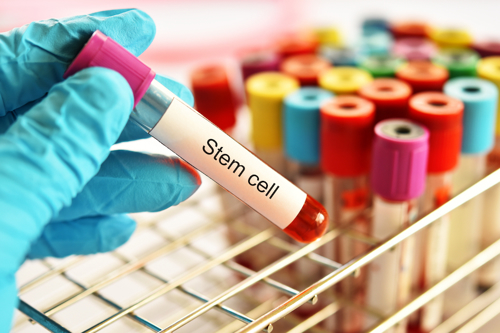
What is cord blood and what can it be used for?
September 11, 2008

- Related Topic:
- Stem cells
A curious adult from California asks:
"What is cord blood and what diseases does it cure currently? Can it be used to treat siblings and parents diseases? Is it really as helpful as the collection agencies make them sound? Is it worth the investment?"
Cord blood is the blood that is left in the umbilical cord and placenta after a baby is born. Just like our blood it is full of cells that carry oxygen, fight off infection, and help our blood clot.
But cord blood is different from adult blood because it also has stem cells. These hematopoietic stem cells can turn into any type of blood cell. In fact, blood-forming stem cells found in cord blood are similar to what we find in adult bone marrow.
This is why cord blood can be used to treat many of the same diseases that bone marrow transplants are used for. These include certain types of cancer, blood disorders, metabolic disorders, and immunodeficiencies.
So who can use cord blood? Cord blood can definitely be used to treat people in your family. But the chance someone in your family will get a disease that cord blood can cure is very low. One estimate is that somewhere between 0.04% (1 in 2500) to 0.0005% (1 in 200,000) of people will use the cord blood that they store at a private blood bank.1
But your relatives aren't the only ones who can benefit from cord blood. It can be used to treat non-family members too. Unlike private blood banks where you have to pay to store your cord blood, there are public banks you can donate to for free. This way anyone who needs cord blood to treat their disease will have access to it.
You've asked some really great questions, so I'd like to spend a little more time answering each one in more detail. Let's learn more about cord blood stem cells, how cord blood can be used like bone marrow to treat diseases, and the pros/cons of private and public cord blood banks.

Cord blood stem cells and transplants
Cord blood comes from the blood that remains in the umbilical cord and placenta after birth. Since the baby no longer needs this extra blood, collecting it is not harmful to the mother or child. But the cells found in this blood can be very helpful.
The specialized stem cells in cord blood can give rise to ALL the different types of blood cells in our bodies. This is why cord blood can be used to treat so many different diseases.
But just like any other organ transplant, the blood from the donor needs to "match" with the person receiving the blood. What exactly does matching mean?
Well, our cells have proteins on them so that our immune system can recognize and kill invading cells. These germ-fighting white blood cells found in our blood are what keep us healthy. They do this by only attacking cells whose proteins don't match ours.
But when people receive cord blood transplants, their immune system is destroyed and replaced with the new cord blood. If this blood is not a very good match, the white blood cells from the transplanted cord blood can attack the body. This can be a very serious and deadly side effect from cord blood and bone marrow transplants.
So doctors need to match donors and recipients to make sure the proteins on their cells are similar. Three different proteins are used for primary matching. Since we have two copies of each protein (one from our mom and dad), the best match is a 6 out of 6. Additional proteins are also sometimes used to find better matches.
Cord blood vs. bone marrow transplants
Cord blood transplants and bone marrow transplants can be used to treat many of the same diseases. But what are the differences and is one better?
Although it is not perfect, cord blood has some major advantages over bone marrow. For one, bone marrow transplants work best with a 6 out of 6 match. But cord blood works well with a 5 out of 6, and pretty well with a 4 out of 6 match!2
Also, because the cord blood cells are a bit more "immature" than adult bone marrow cells, there is less chance that they will attack the host body. That's probably why cord blood can be used for transplants even if it's not a perfect match.

Another advantage is that once cord blood is donated to a public bank anyone who is sick can use it right away! And it can be frozen up to ten years and still work.
With bone marrow transplants, doctors need to search through databases to find people who have volunteered to donate their marrow. Getting bone marrow from donors can be very painful and has to be used fresh.
So what's the downside of cord blood? Well, one problem is that the amount of blood from one cord and placenta is very small. That's not such a big problem when using cord blood on kids. But adults are larger and need more blood cells.
Scientists are working out different ways to get around these problems. One is transplanting two batches of cord blood. Another is trying to use special tricks to increase the number of cells in one batch of cord blood.
It's been 20 years since the first cord blood transplant in 1988. Since then, at least 20,000 units of cord blood have been distributed worldwide.3 As scientists learn more about cord blood stem cells we will likely get even better at curing diseases.
Private vs. public cord blood storage
You've learned all about what cord blood is and how it is similar to and different from bone marrow transplants. Now let's talk more about the differences between private and public cord blood storage and which might be best for you.
Private cord blood storage is where a for-profit company will store your cord blood for you to use for your family's needs. Prices vary, but from what I could find it usually costs at least $1,000 for the genetic testing of the blood and ~$100 a year for storage. So if you keep the cord blood for 10 years that's about $2,000.
Two thousand dollars really doesn't seem like that much if it can be used to save someone's life, so why isn't everyone using private cord blood storage? Well, there are actually a lot of reasons.
One is that the chance that someone in your family will have one of the diseases that cord blood can cure is very, very low. Like I mentioned before, most people won’t use their banked cord blood; somewhere between 1 in 2500 to 1 in 200,000 might use their own cord blood.1 So unless you currently have someone in your family that is sick, the chances are you'll never use the blood you store.
Another is that family members aren't always perfect matches. While you’re more likely to match family compared to a random stranger, it isn’t guaranteed you’ll find a fully matched donor in your family.

So does that mean storing cord blood is a complete waste? No, definitely not! Private banking may not be the best choice but everyone should consider public banking. This way people who need life-saving transplants have a higher chance of finding a match.
If someone needs a bone marrow transplant there's a 75% chance they'll find a matched unrelated donor if they are of Western European origin.4 But with many ethnic groups only 20-30% of people will find a match.4
If more people donate cord blood to public banks then there's a better chance that someone who is sick can find a match. This is especially true for minorities such as African Americans.
I don't think privately banking cord blood is a bad thing. But the chance you or someone in your family will need it is very low. So why not donate to a public bank instead?
Read More:
- Be the Match: Cord blood and transplants
- The Leukemia & Lymphoma Society: Cord Blood Stem Cell Transplantation
- World Marrow Donor Association: Cord Blood
- FDA: Cord Blood: What you need to know

Author: Jackie Benjamin
When this answer was published in 2008, Jackie was a Ph.D. candidate in the Department of Cancer Biology, studying cell-cell adhesion and membrane dynamics in James Nelson's laboratory. Jackie wrote this answer while participating in the Stanford at The Tech program.
 Skip Navigation
Skip Navigation
